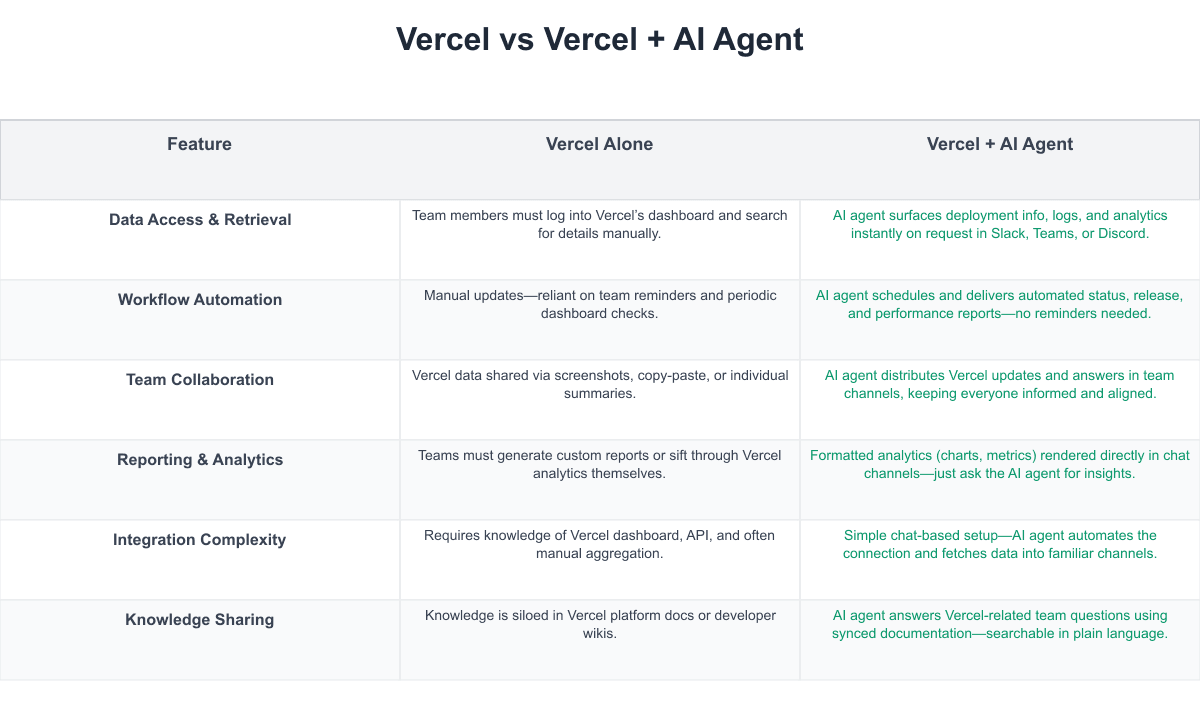AI Agent Workflow Automation for Vercel
Ask the AI agent in Slack for real-time Vercel deployment status and receive instant, clear summaries for your team. Enhance your Vercel workflows with AI-powered automation in Slack, Teams, and Discord.

Vercel has become a go-to platform for frontend development teams who want fast, reliable deployment and performance monitoring. But as teams grow and projects scale, surfacing critical Vercel data and coordinating around releases often means toggling between dashboards, endless Slack pings, and manual status checks. That’s where Runbear’s AI agent transforms Vercel workflows—bringing instant insights, automation, and natural-language collaboration right into the tools your team already uses.
About Vercel
Vercel is a cloud platform built for frontend developers, specializing in the deployment, hosting, and scaling of modern web applications. Its frictionless integration with tools like GitHub, GitLab, and Bitbucket makes deploying websites as simple as pushing code to a repo. Vercel’s serverless architecture, automatic global CDN, and best-in-class Next.js support remove complexity from the development lifecycle. Core features include instant preview deployments, automated performance monitoring, and streamlined production releases. Teams choose Vercel to empower developers with rapid prototyping, robust scaling, and seamless collaboration across the entire app lifecycle—from build to deploy to monitor. Vercel serves fast-growing startups, digital agencies, and enterprise organizations aiming for high-velocity frontend delivery.
Use Cases in Practice
When you connect Vercel to Runbear, your team's daily development rituals change for the better. Instead of waiting on a lead developer to check deployment logs or remind everyone when a release goes live, a smart AI agent is always ready to help. For example, need to know the status of the last deployment? Anyone on the team can ask the AI agent in your Slack channel for a status update, and get a concise report instantly. You can also set up scheduled jobs: imagine the AI agent posting a neat summary of all production releases every morning, keeping the whole team in sync. But there's more—performance analytics that once required digging through Vercel’s interface can now become interactive conversations. Team members simply ask about metrics like First Contentful Paint, and the AI agent responds with actionable visualizations and context. If anyone gets stuck on Vercel settings or deployment best practices, they have an always-available teammate: ask a question in chat, and the agent searches your synced documentation and delivers an answer, much like in our internal search automation. By embedding these capabilities in your team's communication platform, AI agents help turn Vercel's technical edge into a true team advantage.
Vercel vs Vercel + AI Agent: Key Differences

Integrating Vercel with Runbear transforms development and operations workflows from manual checks and siloed dashboards into collaborative, AI-powered automation. With Runbear, teams can surface Vercel data, stats, and insights directly in communication channels, reduce context-switching, and trigger actions with natural language. The result? Faster decision-making, improved transparency, and a unified workflow that keeps everyone in sync.
Implementation Considerations
Adopting the Vercel-Runbear workflow requires some thoughtful planning. Teams should align on which Slack or Teams channels will host the AI agent and clarify data permissions for accessing Vercel info. There’s initial setup to connect Vercel accounts and configure the desired schedule or queries for automated reporting. Team training is essential—members must understand how to interact with the AI agent and trust its responses, especially when acting on deployment data. Security is paramount: ensure only authorized users can trigger certain actions or access sensitive analytics. Finally, evaluate the cost-benefit tradeoff; while automation can save time, upfront integration and occasional tuning may be needed to fully realize efficiency gains. Change management, especially for teams used to old dashboards, is critical for long-term adoption and impact.
Get Started Today
Integrating Vercel with a Runbear AI agent positions your team for next-level productivity, clarity, and speed. From smart project updates in Slack to instant, accurate performance insights, you’ll eliminate manual busywork and keep everyone focused on shipping great products. As your team evolves, the intelligent agent adapts with you—getting smarter and more helpful with every interaction. Ready to accelerate your team’s Vercel workflows? Try the Runbear integration today and experience the future of collaborative automation firsthand.